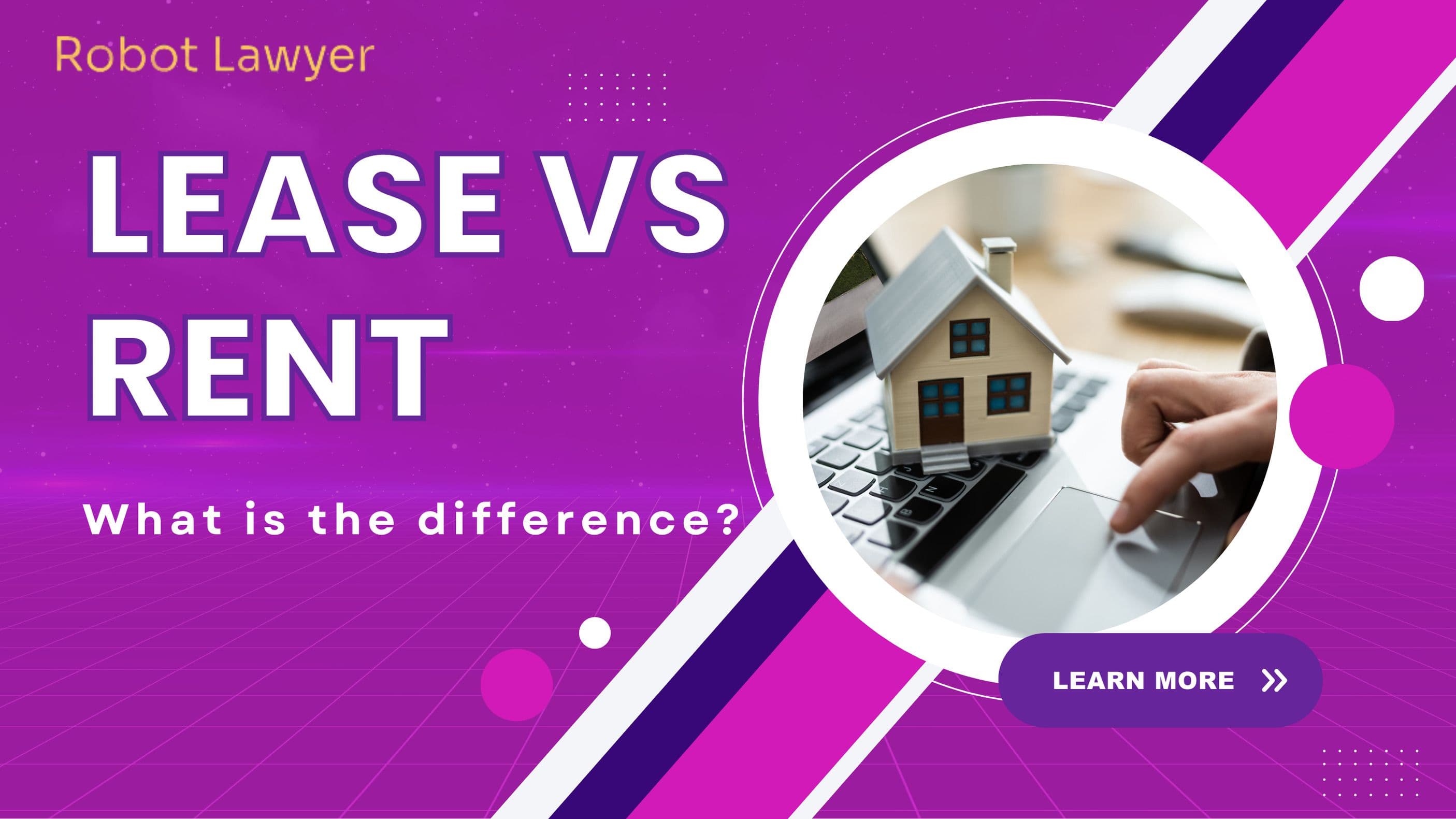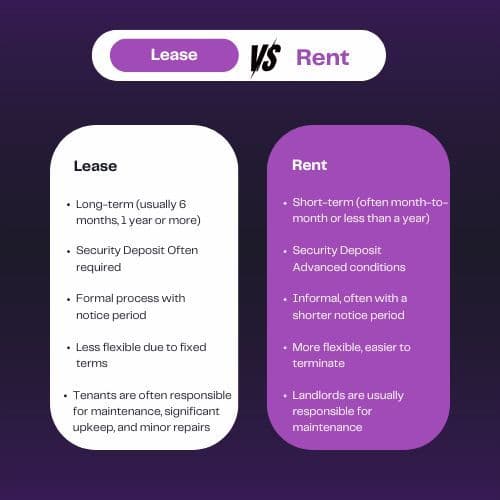
Often, people get confused between the terms lease and rent. While having some similarities, both terms have significant differences that affect the agreement and obligations. In simple terms, rent is a short-term payment arrangement, whereas lease meaningto have a fixed-term contract for a specified period of time.
For instance, the difference between rented vs leasedproperty is that with a rented property, you pay the rent monthly, and it often includes some utilities or services. The agreement is usually short-term and may require filling out a simple tenancy agreement, which can sometimes be verbal, though written is more secure and enforceable.
Conversely, with a leased property, you commit to being a tenant for a longer term, typically through a detailed, legally binding lease agreement. Leases often offer more stability and fixed conditions for both parties over the agreed period.
To understand both the terms, that is, what is a lease and what is rent, the key difference, along with the pros and cons they come with, continue reading!
Lease vs Rent
If you are thinking about leasing or renting a property but are confused about the difference, the main distinction in lease vs rent lies in their duration.
The table below will help clarify the key differences between rented vs leased properties:

What Does Lease Mean?
Understanding the lease meaning is essential before signing any agreement to avoid confusion about your rights and obligations.
A lease refers to a legally binding agreement between a lessor, who owns the property, and a lessee, who rents or leases the property. All the terms and conditions are important to mention in the lease agreement, including the duration of the lessee's residence and constant payments to the lessor.
Remember that lease does not automatically extend beyond the end of the term. However, some leases allow tenants to sign month-to-month after the original term.
In order to avoid disagreements, a lease agreement usually spells out what both the landlord and the renter are expected to do. This includes things like the amount of the rent and deposit, rules about how the space can be used (like a pet policy), whether or not there is a parking spot and other details.
A lease is opted over rent in the following common cases:
- When the tenant is looking for long-term stability.
- The landlord needs more security and commitment from the tenant.
What to know about leasing a house?
A benefit of leasing a house is that the tenants are protected from life’s uncertainties while, at the same time, they are not locked out of the housing market by buying homes on the real estate. These contingent relations characterise any lease in terms of the rental period, rental charge, and other terms such as maintenance.
When you lease with someone, such as a private landlord, the contract may offer unique options, including “option to buy” or “rent-to-own” clauses. They can enable tenants to use rental payments to make down payments depending on the contracts of individual agreements. On the other hand, rent-to-own agreements are favoured most by families who experience difficulty in qualifying for conventional mortgage loans, thus leading to homeownership.
Pros of Leasing an Apartment
It doesn’t matter for what reasons you are leasing a property, it can offer you several different advantages:
- Economical: Lessors can save money on property maintenance and reduce the risk of high tenant turnover by signing longer leases.
- More availability: Short-term leases are less prevalent than longer-term leases, possibly due to tenant turnover and the above-stated higher maintenance expenses. That might increase your possibilities and make long-term leases more readily available.
- Fixed monthly payment: If you sign a lease for a year or more, you know that you will be making the same payment every month. This is different from short-term rentals, where the owner may change the rent without giving you much notice.
Cons of Leasing an Apartment
Leasing an apartment has a few negative aspects, even if there are some advantages.
- Longer commitment: Leasing usually comes with lengthier terms of agreement. This implies that if you relocate or change the job, you could have to terminate your lease early and deal with the fallout.
- Consequences of Breaking a Lease with Someone: Signing a lease commits you over a long period. If you have to break the lease for any reason, you might be charged a fee and have to pay rent until the lease expires or until the lessor finds someone else to lease your flat; thus, you could lose your security deposit or all the above.
- Lease restrictions: If the lease forbids alterations like adding a housemate or subletting the flat, you might find yourself stranded.
What Does Rent Mean?
Renting is the temporary arrangement whereby one person lives in or utilizes a piece of land held by another party.
Rent is the consistent payment a renter leasing a house or flat makes to their landlord. The landlord of a rented property has the authority to alter the conditions of the rental agreement as deemed appropriate. A regular rental agreement also has validity month to month.
Pros of Renting an Apartment
Some of the advantages of renting an apartment are:
- Flexibility: Usually, month-to-month rental agreements give more freedom to walk out or modify terms with less notice.
- Low commitments: Ideal for people who might have unclear goals or seek a temporary solution with lower commitment.
- Easier to make changes: Agreements are less formal and shorter in length; hence, negotiations or changes of conditions are more straightforward.
- Easy to adapt: Appropriate for circumstances like transient job assignments or students where long-term dedication could be more realistic.
Cons of Renting an Apartment
- Increase in rent: Landlords' more frequent rent adjustments affect financial planning and budgeting.
- Less Stability: If you would like to spend a lot of time in one location, this might be troublesome as long-term security is lacking.
- Unpredictable Terms: Terms can be changed more quickly, so abrupt rent increases or changes in rental circumstances could find a place.
- Notice: If the landlord opts to terminate the arrangement, you might have limited notice times.
Documentation is crucial for both renting and leasing so that everything is clear and you are protected legally. Also, in any emergent case, it is good to have a clear understanding of the difference between lease and rent in order to avoid conflicts. In addition, when one wishes to sign a lease vs rentagreement, it is essential to make the right choices since specific clauses matter in ensuring a smooth running business.
How Can We Help?
Now you may have understood the difference between lease and rent, including their pros and cons. However, it is also important to learn that the agreements for both lease and rent contain different terms and conditions. These include the duration, payment structure, and responsibilities of both parties.
To create a customized document for either lease or rental purposes, Robot Lawyer can assist you with all the necessary steps. We offer various rent-related documents, such as the Rent Repayment Plan and Rent Receipt.
For lease agreements, you can choose from different options, including the Commercial Lease Termination Agreement and Ground Lease Agreement.
To explore our services, sign up or log in with your email ID and password; you can also try them for free! Generate dependable legal documents effortlessly and securely.
Frequently Asked Questions
Q.1. What is the primary disadvantage of leasing?
A.1. The primary disadvantage is when you lease a property, you will usually have to make long-term commitments. In case you change your mind or your requirements, it becomes pretty difficult to break that agreement.
Q.2. What are the benefits of lease vs rent?
A.2. The benefits of lease vs rent is that leasing involves stability with fixed terms and rate. On the other hand, rent offers flexibility for short-term needs. Thus, if you are looking for r temporary arrangements choose a rent agreement.
Q.3. Why is it better to lease?
A.3. Considering rented vs leased properties, leasing is preferable where the occupants are looking for long-term security, as leasing contracts are usually more consistent and cheaper in monthly installments than rent contracts. Also, in the case of the rental agreement, the owner may increase the rent pay in a few months. However, that’s not the case in leasing because the amount remains the same for a fixed period.
Q.4. What does leased and rent mean?
A.4. Lease is a rental agreement of property or equipment sometimes with an extensive and precise time span. However, rent suggests a type of tenure that is often recognised to be a short-term one which is known to be renewed monthly; therefore, it is less permanent (but more mobile).